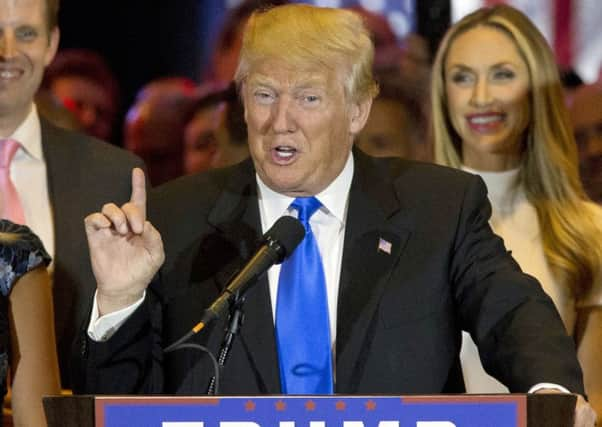Leaders: Trump's stand-off with PM promises new relationship


When Prime Minister David Cameron dismissed Donald Trump’s call for a temporary ban on Muslims entering the US as “divisive, stupid and wrong” it seemed only a matter of time before the business magnate’s run for the White House would fall short.
His contentious remarks drew criticism around the world. Downing Street’s response was probably drafted in the belief that a political sideshow would remain just that.
Advertisement
Hide AdAdvertisement
Hide AdYet five months later, with the New Yorker now the presumptive Republican candidate for the presidency, those three words have again come into play, sparking debate over what relations Britain might have with a US administration helmed by Mr Trump.
In an interview with ITV’s Good Morning Britain, Mr Trump made clear he had not forgotten Mr Cameron’s comments, signalling that “it looks like we’re not going to have a very good relationship”.
Should what was once inconceivable come to pass, and Mr Trump takes up residence in the Oval Office, political scientists will have a field day scrutinising what form those transatlantic ties take. For diplomats, the prospect is no doubt less welcome.
Asked to respond to Mr Trump’s comments, Mr Cameron’s official spokesman maintained he stood by his remarks. The Prime Minister, he added, was committed to “maintaining the special relationship” and would work with whoever is president of the United States.”
There is of course a possibility that Mr Cameron may well have exited by November if things do not go his way over Europe, but given Mr Trump’s nature, it probably would not be long before he falls out with Mr Cameron’s successor.
It is Mr Trump’s belligerent, outspoken character that has animated vast swathes of the US electorate, but what works in a Republican campaign is no guarantee of making a success of a presidency.
Many on both sides of the Atlantic might embrace the principle of a western leader who eschews the guarded language of international diplomacy in favour of sincerity, particularly if it applies between Britain to the US.
Realpolitik, however, dictates that sincerity is a rare virtue on the world stage, where what is not said is often more important than what is. Quite how – or if – Mr Trump would rein in his trademark verbosity and aggressive rhetoric is a question that is increasingly exercising minds in Washington.
Advertisement
Hide AdAdvertisement
Hide AdHis campaign has offered scant detail on foreign policy. In its place there has been bluster and not-so-subtle threats. Take for example his response to a question in February concerning his stance on North Korea’s Kim Jong Un. “I would get China to make that guy disappear in one form or another very quickly,” he replied.
If Britain and the US could not get along, one has to wonder how the US would have workable foreign relations with anyone. Perhaps Mr Trump will come to realise the importance of world affairs, and bluntly, how it is better to have friends than not.
Everyone a loser in exam lottery
As any pupil or parent will attest, exam season can prove to be a stressful and unsettling time. Few, however, should have reason to feel unnerved by the way the system is set up.
Yet research out today highlighting a so-called ‘exam lottery’ across Scotland will understandably lead to concerns. Reform Scotland’s study claims there is an “inequality in opportunity” for pupils taking National 4 and 5s, which replaced the old Standard Grade exams in 2014.
The think-tank has submitted a series of Freedom of Information requests to councils which reveal that, while youngsters in some areas are able to sit up to eight exams in S4, others are limited to just five, depending on their school.
Reform Scotland say those schools offering fewer subjects have done so based on a “crude calculation” of the number of hours of study available in S4. According to Keir Bloomer, a member of the body’s advisory board, this undermines Scotland’s new national curriculum. “Curriculum for Excellence had the admirable aim of broadening our children’s education, but in this case it is narrowing it,” he argues.
The Scottish Government has said the curriculum is about providing students with a “range of qualifications and experiences”. That may well be the case, but restricting subjects might well curb the aspirations of young learners and prevent them taking a certain route through university or the jobs market.
In light of this new research, the calls for a national body to oversee the education of our children rather than disparate local authoroities will grow even louder and surely become even harder to resist.